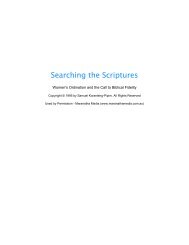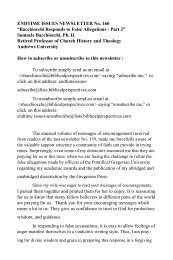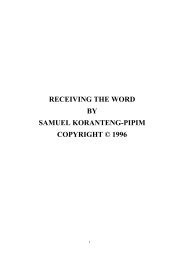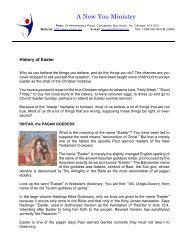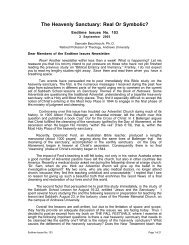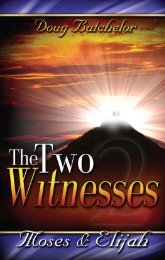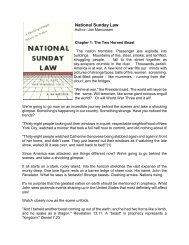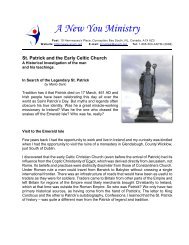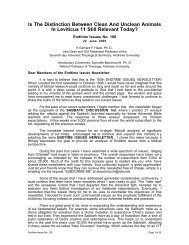Bible Readings for the Home Circleâ1914 - A New You Ministry
Bible Readings for the Home Circleâ1914 - A New You Ministry
Bible Readings for the Home Circleâ1914 - A New You Ministry
Create successful ePaper yourself
Turn your PDF publications into a flip-book with our unique Google optimized e-Paper software.
BIBLE READINGS<br />
because that <strong>for</strong> six thousand years <strong>the</strong> world‘s inhabitants have disregarded<br />
<strong>the</strong> Sabbath. See this period and condition pointed out in<br />
Rev. 20:1–4; Isa. 24:1–6; Jer. 4:23–27. The periods of rest and desolation<br />
of <strong>the</strong> land are divinely appointed sabbatical compensations <strong>for</strong><br />
man’s irreligion, as manifested in Sabbath desecration. They are impressive<br />
lessons on <strong>the</strong> importance of keeping <strong>the</strong> Sabbath, and <strong>the</strong><br />
results of breaking and disregarding it.<br />
9. After Israel’s restoration from <strong>the</strong> Babylonian captivity, what did<br />
Nehemiah say was <strong>the</strong> reason <strong>for</strong> <strong>the</strong>ir punishment<br />
“Then I contended with <strong>the</strong> nobles of Judah, and said unto <strong>the</strong>m, What<br />
evil thing is this that ye do, and profane <strong>the</strong> Sabbath day Did not your fa<strong>the</strong>rs<br />
thus, and did not our God bring all this evil upon us, and upon this city yet ye<br />
bring more wrath upon Israel by profaning <strong>the</strong> Sabbath.” Neh. 13:17, 18.<br />
10. How does he speak of God’s giving <strong>the</strong> Sabbath to Israel<br />
“Thou camest down also upon mount Sinai, and spakest with <strong>the</strong>m<br />
from heaven, and gavest <strong>the</strong>m right judgments, and true laws, good statutes<br />
and commandments: and madest known unto <strong>the</strong>m Thy holy Sabbath.”<br />
Neh. 9:13, 14.<br />
NOTE.— Let it be noted that this text does not say that God made <strong>the</strong><br />
Sabbath <strong>the</strong>n, but simply that He made it known to Israel <strong>the</strong>n. They<br />
had largely <strong>for</strong>gotten it while in Egypt. See pages 419, 423.<br />
11. How did Christ, while on earth, regard <strong>the</strong> Sabbath {460<br />
460}<br />
“And He came to Nazareth, where He had been brought up: and, as<br />
His custom was, He went into <strong>the</strong> synagogue on <strong>the</strong> Sabbath day, and<br />
stood up <strong>for</strong> to read.” Luke 4:16.<br />
12. By what did Christ recognize <strong>the</strong> Sabbath law<br />
“And He said unto <strong>the</strong>m, It is lawful to do well on <strong>the</strong> Sabbath days.”<br />
Matt. 12:11, 12.<br />
NOTES.—William Prynne says: “It is certain that Christ Himself, His<br />
apostles, and <strong>the</strong> primitive Christians <strong>for</strong> some good space of time, did<br />
constantly observe <strong>the</strong> seventh-day Sabbath.” “Dissertation on <strong>the</strong><br />
Lord’s Day Sabbath,” page 33.<br />
Morer, a learned clergyman of <strong>the</strong> Church of England, says: “The<br />
primitive Christians had a great veneration <strong>for</strong> <strong>the</strong> Sabbath, and spent <strong>the</strong><br />
day in devotion and sermons. And it is not to be doubted that <strong>the</strong>y<br />
derived this practice from <strong>the</strong> apostles <strong>the</strong>mselves, as appears by several<br />
scriptures to that purpose.” Morer’s “Dialogues on <strong>the</strong> Lord’s Day,” page<br />
189.<br />
The historian Neander says: “Opposition to Judaism introduced<br />
<strong>the</strong> particular festival of Sunday very early, indeed, into <strong>the</strong> place of<br />
<strong>the</strong> Sabbath. . . . The festival of Sunday, like all o<strong>the</strong>r festivals, was<br />
always only a human ordinance, and it was far from <strong>the</strong> intentions of<br />
<strong>the</strong> apostles to establish a divine command in this respect,—far from<br />
THE SABBATH IN HISTORY<br />
<strong>the</strong>m, and from <strong>the</strong> early apostolic church, to transfer <strong>the</strong> laws of <strong>the</strong><br />
Sabbath to Sunday. Perhaps at <strong>the</strong> end of <strong>the</strong> second century a false<br />
application of this kind had begun to take place; <strong>for</strong> men appear by<br />
that time to have considered laboring on Sunday as a sin.” Neander’s<br />
“Church History,” Rose’s translation, page 186.<br />
Dr. Lyman Abbott says: “The current notion that Christ and His<br />
apostles authoritatively substituted <strong>the</strong> first day of <strong>the</strong> week <strong>for</strong> <strong>the</strong><br />
seventh, is absolutely without any authority in <strong>the</strong> <strong>New</strong> Testament.”<br />
Christian Union, June 26, 1890.<br />
Archdeacon Farrar says: “The Christian church made no <strong>for</strong>mal,<br />
but a gradual and almost unconscious transference of <strong>the</strong> one day to<br />
<strong>the</strong> o<strong>the</strong>r.” The Voice From Sinai,” page 167.<br />
13. What was <strong>the</strong> first ef<strong>for</strong>t of <strong>the</strong> Roman Church in behalf of <strong>the</strong><br />
recognition of Sunday<br />
In 196 A.D., Victor, bishop of Rome, attempted to impose on all <strong>the</strong><br />
churches <strong>the</strong> Roman custom of having <strong>the</strong> Passover, or Easter, as it is<br />
commonly called, celebrated every year on Sunday. See Bower’s “History<br />
of <strong>the</strong> Popes,” Vol. I, pages 18, 19.<br />
NOTE.— This, Dr. Bower, in his “History of <strong>the</strong> Popes,” Vol. I, page 18,<br />
styles “<strong>the</strong> first essay of papal usurpation.”<br />
14. What was one of <strong>the</strong> principal reasons <strong>for</strong> convoking <strong>the</strong> Council<br />
of Nice<br />
“The question relating to <strong>the</strong> observance of Easter, which was agitated<br />
in <strong>the</strong> time of Anicetus and Polycarp, and afterward in that of Victor,<br />
was still undecided. It was one of <strong>the</strong> principal reasons <strong>for</strong> convoking <strong>the</strong><br />
Council of Nice, being <strong>the</strong> most {461<br />
461} important subject to be considered<br />
after <strong>the</strong> Arian controversy.” Boyle’s “Historical View of <strong>the</strong> Council<br />
of Nice,” page 23, edition 1836.<br />
15. How was <strong>the</strong> matter finally decided<br />
“Easter day was fixed on <strong>the</strong> Sunday immediately following <strong>the</strong> full<br />
moon which was nearest after <strong>the</strong> vernal equinox.” Id., page 24.<br />
16. In urging <strong>the</strong> observance of this decree on <strong>the</strong> churches, what<br />
reason did Constantine assign <strong>for</strong> it<br />
“Let us have nothing in common with <strong>the</strong> most hostile rabble of <strong>the</strong><br />
Jews.” Id., page 52.<br />
17. What had Constantine already done, in 321 A.D., to help <strong>for</strong>ward<br />
Sunday to a place of prominence<br />
He issued an edict requiring “<strong>the</strong> judges and town people, and <strong>the</strong><br />
occupation of all trades” to rest on “<strong>the</strong> venerable day of <strong>the</strong> sun.” See<br />
Encyclopedia Britannica, article “Sunday;” and this work, page 443.<br />
18. Who did Eusebius, bishop of Caesarea, and one of Constantine’s




